Search
Remove Ads
Advertisement
Summary 
Loading AI-generated summary based on World History Encyclopedia articles ...
Search Results

Definition
Council of the Indies
The Council of the Indies (El Real y Supremo Consejo de las Indias) operated from 1524 to 1834 and was the supreme governing body of the Spanish Empire in the Americas and Spanish East Indies. Reporting directly to the monarch, the Council...
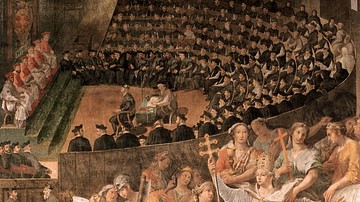
Definition
Council of Trent
The Council of Trent (1545-1563) was a meeting of Catholic clerics convened by Pope Paul III (served 1534-1549) in response to the Protestant Reformation. In three separate sessions, the council reaffirmed the authority of the Catholic Church...

Definition
Council of Chalcedon
The Council of Chalcedon was called in 451 CE by the Roman Emperor Marcian (r. 450-457) to settle debates regarding the nature (hypostases, "reality") of Christ that had begun at two earlier meetings in Ephesus (431 CE and 439 CE). The question...

Definition
Council of Clermont
The Council of Clermont in central France was held in November 1095 and witnessed Pope Urban II's (r. 1088-1099) historic call for the First Crusade (1095-1102) to capture Jerusalem for Christendom from its Muslim occupiers. The Pope's speech...
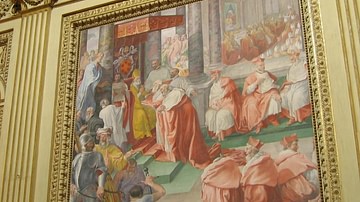
Article
Canons of the Council of Trent
The Canons of the Council of Trent (1545-1563) were rules one was expected to follow in order to be a member of the Catholic Church and, according to the Church's teachings, merit the grace of God and eternal life in heaven after death. The...

Definition
Galileo Galilei
Galileo Galilei (1564-1642) was an Italian mathematician, physicist, astronomer, and natural philosopher. He created a superior telescope with which he made new observations of the night sky, notably that the surface of the Moon has mountains...
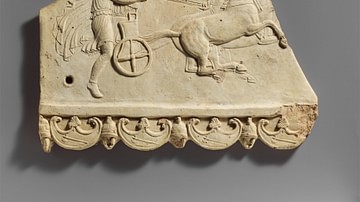
Definition
Pelops
Pelops was a Greek hero and king of Pisa in Greek mythology. As the son of Tantalus, he was a member of the cursed House of Atreus, and was cruelly sacrificed by his father in a twisted way to test the gods – an act that backfired and led...
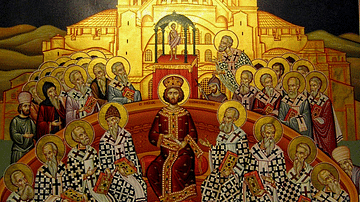
Image
First Council of Nicaea
Icon from the Mégalo Metéoron Monastery in Greece, representing the First Ecumenical Council of Nicaea in 325 CE, with the condemned Arius in the bottom of the icon.

Image
Fresco Depicting the Council of Trent
Council of Trent (1545-1563), fresco by Pasquale Cati, 1588.
Basilica of Santa Maria in Trastevere.
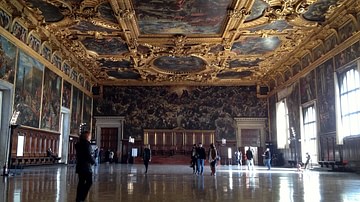
Image
Hall of the Great Council, Doge's Palace, Venice
Hall of the Great Council, Doge's Palace, Venice. The room is 53 meters long and 25 meters wide (173 x 82 ft) and can seat 2,000 people. On the back wall is one of the largest oil paintings on canvas in the world: The Glory of Paradise by...